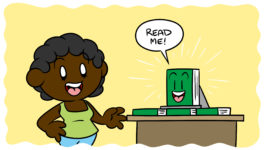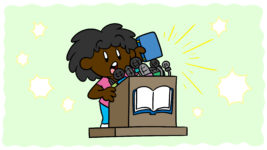Indie publishing seems to be having its heyday. It’s not only easier than ever to self-publish, some of the stigma that used to go along with self-publishing is also starting to disappear. Rupi Kaur’s self-published Milk and Honey made the New York Times best seller list; Andy Weir’s The Martian started off as a blog and grew into a Matt Damon film; and look into the background of a movie like After and it’s entirely possible you’ll someone’s fan fiction as the source material.
That’s not to say that self-publishing is easy. Indie authors are launching their work into a saturated marketplace where smart marketing is imperative, often with little to no experience of how things are done. New paths are being carved into the landscape of publication and literature, and so a lot of questions arise that haven’t needed to be asked before. Some of those questions are practical, but others are moral, and that’s what we’ll be looking at today.
I’m not going to give any moral directives here, but if you are looking to self-publish, it’s worth understanding the choices you’ll be asked to make and considering how they stack up to your own moral standards. So, let’s begin!
The environmental question
Many authors, as devoted readers, have a special place in their hearts for physical books. True, there are few things as cozy as a well-thumbed novel, smelling of libraries and aged paper, paired with the right cup of tea and a good armchair. As more and more book-lovers log their pages on e-readers, though, we are compelled to ask whether it is fiscally and environmentally responsible to print on paper.
There may be some books that benefit aesthetically from appearing in true print, and others may have audiences that prefer physical copies. It can still be a valid decision to have print and e-versions of your book, it’s just worth asking in advance if it’s necessary or even beneficial to do so. If you’re set on print, you may want to explore your options. Print-on-demand safeguards against excess copies and therefore eliminates paper waste. Printing on recycled paper might also be a smart way to reduce your environmental impact. If you choose to e-print or use recycled paper, let your readers know in the afterword or on the flyleaf. This will encourage eco-consciousness and endear you to an increasing number of readers for whom environmental stewardship is a core value.
The humanitarian question
Right up there with environmentalism among readers’ chief ethical concerns may be the question of human rights. Like so many other products, book covers are often outsourced to companies that exploit underpaid workers in order to offer a lower price. People have different opinions on whether low-wage labor is better than no labor, or if all imports should be upgraded to fair trade or else boycotted.
Where you land on this issue is your personal choice, but it’s good to be aware that not all book covers are printed (or designed) equally. If this is an issue for you and you’re buying online, poke around the service’s site a little or simply ask them who actually makes their covers. Any service that believes they’re handling things the right way won’t be cagey with this information.
The question of association
In the push to get your book into the hands of readers and generate some excitement about it, it’s tempting to post your title or synopsis anywhere that will let you. However, you may want to vet anyone that offers to help you advertise. Even if they never ask you for a return favor – and thus put you in the position of promoting something you don’t stand for – people tend to assume guilt by association. Robert Cialdini calls this out in his Influence: The Psychology of Persuasion (a great read for any author, or really any person):
There is a natural human tendency to dislike a person who brings us unpleasant information, even when that person did not cause the bad news. The simple association with it is enough to stimulate our dislike.
– Robert B. Cialdini, Influence
Guilt by association is often a subconscious assumption, but nevertheless a powerful one. When people see your name and book title on somebody’s page, they are almost certain to subconsciously adopt the opinion that you more or less agree with any core issues that pop up on that site. While it’s a beautiful thing to be open-minded enough to dialogue with anyone, condoning someone’s platform is different than engaging in dialogue with them. You don’t have to agree with everything an individual or organization espouses before you collaborate with them, but if your core beliefs aren’t in sync, you may want to think twice about having them promote your book.
This is especially true in online spaces, and particularly on social media. Each site tends to build up its own implicit language that can be unclear from the outside. For example, the function on Twitter that allows you to save comments to read later brands them with a heart, suggesting support you may not feel, and retweeting someone without comment is usually taken to suggest that they’re either saying something you absolutely agree with or (less commonly) that you so obviously disagree that no comment is needed. Many new Twitter users have fallen afoul of sharing something they just thought worthy of discussion and giving people the impression that it’s their strongly held belief. While some of the moral burden is on your audience to give you the benefit of the doubt, it’s also sensible to research a site, group or individual before you engage.
The question of integrity
It was not uncommon for French opera houses of the 1800s to hire professional audience members who would – for a fee – applaud, cheer, laugh, and cry at all the right moments and thus fill the house with cries of adulation. Being the social creatures that humans are, the rest of the audience would be compelled to emote and express right alongside the hired goons.
So, in a way, paying for social media followers and positive reviews is not a new thing. But seeing as none of us has ever, or likely will ever, direct an opera and needs somebody to shout ‘brava’ at all the right moments, it is a new consideration for today’s indie authors.
At the end of the day, you need to know what you’re comfortable with. One way to gain perspective on this point might be to ask yourself how you would feel if you learned that one of your favorite authors was doing whatever it is you’re trying to decide if you’re comfortable doing. Paying for reviews, bartering for reviews, paying hush money against negative reviews, and creating fake accounts in order to post fake reviews all stand to impact potential readers’ perception of an author’s integrity.
The question of reputation
Though the world is becoming more accepting of self-published books, that acceptance may be contingent on the ethical choices of authors who choose to self-publish. There are already skeptics so disenchanted with the use of paid or traded reviews that they won’t pick up an indie book except by accident. It is difficult to predict how successful your book will be, and how successful the self-publishing industry will be, if readers feel indie authors in general can’t be trusted, but it’s an important issue to be aware of.
Other elements related to reputation worth considering are the quality of your book’s formatting, materials, andcontents. Pushing a book out before the writing is 100% polished or without a thorough, professional edit adds to the reputation risk factor. If an author like David Sedaris edits his own work 18 to 20 times and then sends it to a professional editor for several rounds of polishing, it’s unlikely that an emerging writer without contacts or fans or prior successes will be able to publish a product that’s going to garner millions of adoring readers. Instead, the risk is that the book will become another sample in a collection of evidence against the quality of self-self-published literature.
It should also go without saying, but I won’t let it go unsaid, that plagiarism is an important aspect of an author’s integrity as well as the reputation of the self-publishing industry. While traditionally published books will likely be flagged for plagiarism, indie books can freely infringe on someone else’s intellectual property without anyone knowing it until the book has gone public.
The question of personal space
People get so much unwanted email that plug-ins have been created whose sole purpose is to help filter and block unwanted senders. Take a moment to think of the email subscriptions that you keep – the ones that you actually open and read. What do they offer? What can you learn from them in terms of making sure you’re not spamming your email subscribers and social media followers? How can you give them something to look forward to?
Marketing can be beneficial to everyone involved, it can even be art, but it’s easy to accidentally turn to the dark side in how you interact with potential readers. There’s a difference between phrasing an email heading so it’s clickable and being actively misleading or alarming. Email headings like ‘We need to talk’ or ‘This is your last chance’ may grab attention, but it’s worth considering the long-term relationship you’re building with your audience.
Moral self-publishing
Nobody can decide for you what your ethical code as an indie author is going to be.
If you are writing fan-fiction, you may choose to ask another lover of the genre to check your work for anything that too closely resembles plagiarism, or you may decide to trust your inner creativity as having respected the integrity of the original work.
You may decide that it’s wrong to pay for positive reviews and to silence negative reviews, but that it’s okay for friends and family to help you out by throwing you some extra Amazon reviews under a pseudonym or two.
You may decide that, so long as you’re explicit about your own values, it’s not your job to perform a background check on everyone who wants to show off your work.
Whatever you decide, you need to own your choices and make sure they align with your personal values. It’s easy to overlook some of these questions or make hasty decisions when you are already feeling overwhelmed by the publication and marketing processes. Remember that the season of stress will pass, and the ethical choices you’ve made will last. Make choices that you’ll be proud of down the road.
What ethical choices have you faced in your own publishing journey, and how did they shake out? Let me know in the comments, and check out How To Use Empathetic Writing To Craft Humane Stories for more great advice on the moral dimensions of your writing career.






2 thoughts on “Ethical Self-publishing In The 2020s: What Authors Need To Know”
How can you self publish with recycled paper?
Thank you for a thoughtful article. My problem as a self-published author is that I do not want to sell my books through Amazon for as long as the company maintains its horrific working conditions in the warehouses. I would be very interested to hear about an ethical alternative – ideally with local POD to avoid overseas transport.